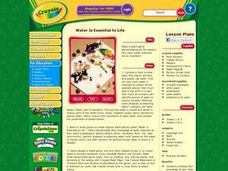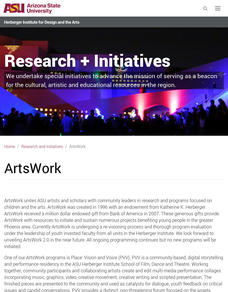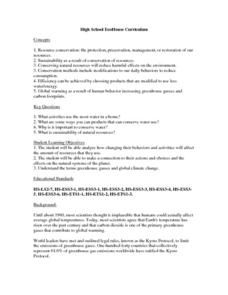Curated OER
Water is Essential to Life
Young scholars increase their knowledge of why clean water resources are essential to the survival of plants, animals, and people. They deomonstrate their understanding of the role of water for sustaining life by creating an original...
Curated OER
Toward a Sustainable Agriculture
Your class considers a case study of a sustainable agro-ecosystem and view a PowerPoint presentation about a sustainable farm. They complete a case study worksheet. Extension activities are included.
Curated OER
Water
Third graders study different bodies of water and how they fit into the water cycle. They explain that materials exist in different states (solid, liquid and gas) and change from one to another, that there are systems, order, and...
California Academy of Science
Exploring Our Growing Need for Water
Pupils explore the amount of water people use in agriculture and for personal use. They compare water usage for various crops to that of raising animals before considering solutions for increased access to safe drinking water worldwide....
TerraCycle
What Can Nature Teach Us about Sustainable Design?
Talk about Velcro®, Gecko Tape, WhalePower turbine blades, and other innovations that mimic nature to inspire your STEM or engineering class. This set of worksheets gets them thinking about imitating nature in terms of sustainable...
Curated OER
Sustainability and Extinction
Galapagos Penguins are the only penguins on earth that live north of the equator (in the wild). In this last lesson plan a discussion on how the Galapagos islands developed their populations and diversity sparks the introduction. Two...
EngageNY
Forming a Research-Based Claim: Stakeholder Chart on Better Industrial Water Management
It's time to stake a claim! Working with partners, scholars create stakeholder charts for better industrial management of water. As they complete the chart, pupils consider an option for managing water more sustainably, identify...
EngageNY
End of Unit 2 Assessment, Part 1A: Fishbowl on Better Use of Water in Agriculture
Just keep swimming! Pupils participate in a Fishbowl discussion, sitting in two concentric circles and alternating between speaking and listening roles. During the discussion, they defend a claim about the best way to begin managing...
Curated OER
High School EcoHouse Curriculum
How has the level of carbon dioxide changed over recent years, and what is contributing it? Groups work together to research and present their findings in a creative way. Also built into the lesson is a visit to a sustainable house, but...
Curated OER
Air and Water in the Environment
Students explore the traits of water condensation and evaporation. In this water cycle lesson, students develop an awareness of the importance of water for sustaining life. Students participate in a hands-on activity in which water is...
Curated OER
Cherishing the Water of Life
Students work in small groups to brainstorm a list of all creatures, plants, natural, and artificial processes that use or depend on fresh water. The class views an aquarium filled with water representing all the water in the world. The...
Curated OER
Keeping our Water Clean
Second graders discuss how our actions impact the quality of water. In this environmental science lesson, 2nd graders watch a short film and discuss the problem of polluted water. Students are then divided into groups and record their...
Curated OER
Round and Round-The Water Cycle
Students explore the water cycle. In this earth science activity, students work in small groups to read various books on the water cycle and take notes on chart paper. Students share their notes and teach a younger audience what they...
Curated OER
Water Cycle (Role of Water)
Second graders explore the role of water as a natural resource in order to conserve and protect its use for future generations.
Curated OER
Plants and the Water Cycle
Students study the role of plants in recycling water by collecting water vapor that is emitted, or transpired, by green plant leaves. They collect and measure the water that transpires through the tiny pores of plant leaves. Afterwards,...
Curated OER
The Water Cycle
In this water cycle learning exercise, students learn about the 3 different stages of the water cycle: evaporation, condensation and precipitation. They then solve the 12 problems on the page. The answers are on the last page.
Forest Foundation
The Sustainable Forest
As part of their examination of forest ecosystems, class members examine how foresters, biologists, botanists, geologists, and hydrologists work to together to develop a management plan for sustainable forests.
Curated OER
Be "Sun-sible" about Heating Water
Students create a solar water heater. In this solar energy lesson, students conduct an experiment to determine which colors absorb more radiant heat. Students investigate the relationship of heat loss to insulation. Students then create...
Curated OER
So Much Water, So Little to Drink
Students explore salt and fresh water. For this water lesson, students investigate the amount of Earth covered by water. Students compare the amounts of salt water to fresh water. Students create a visual representation to aid...
Curated OER
Sustainable Marine Fisheries
Through a fishing simulation, environmentalists discover consequences of over fishing. Afterward, they discuss how the activity relates to the impact of real-life commercial fishing. They also consider sustainability in the fishing...
Curated OER
Drip and Drop's Adventure
Students determine ways of conserving water and write a Big Book about them. In this water conservation lesson, students participate in a puppet show about Drip and Drop, and ways to conserve water. They write a book that tells about...
Curated OER
Survival Still
Lead your class to construct a solar still on campus to demonstrate how water can be extracted from the soil. The power of solar energy is emphasized, as is the concept of how capillary water can be recovered and purified by using a...
University of Wisconsin
Follow the Drop
Young surveyors look for patterns in water flow around campus. Using a map of the school (that you will need to create), they mark the direction of the path of water. They also perform calculations for the volume that becomes runoff. The...
EngageNY
Analyzing Main Ideas and Details: Why Care about Water?
Pay attention to details! After completing text-dependent questions about paragraphs 10-12 of "Water is Life," scholars view the video "Why Care about Water. "They view the video three times and use a Main Idea and Details note-catcher...

























